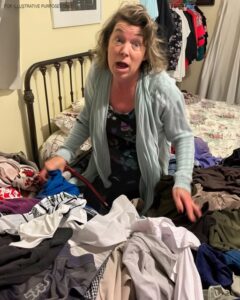But then the wine we’d saved for our anniversary showed up empty in the recycling. The specialty cheese I’d bought for guests was half-eaten before the dinner even began. That’s when I knew something was off.
I started writing things down. Monday: half a tin of cookies, gone. Wednesday: three pieces of chocolate, missing. Friday: the fancy preserves I’d hidden behind the condiments — vanished.
I confronted my husband, Samuel.
“Did you finish the chocolates I got last week?” I asked, casually.
He looked genuinely confused. “What chocolates?”
That was the moment I knew — it wasn’t him. Someone else was helping themselves to our food.
We installed a hidden camera in the kitchen.
Two days later, while at work, I got a motion alert. I opened the feed… and froze.
Pamela — my *mother-in-law* — walked into our kitchen like she lived there. Calm, confident, she poured herself a glass of our special wine and began assembling a snack plate with expensive cheese and fruit.
I stared in disbelief. She wasn’t rushing. She knew exactly where everything was. This wasn’t her first visit.
Then she disappeared down the hallway.
I checked the other cameras. She entered our bedroom. Looked through our closet. Even opened our drawers. My heart sank. She wasn’t just helping herself to snacks. She was crossing every boundary.
The next day, I stayed home from work and waited.
Sure enough, 2 p.m. sharp, she walked in again. I stepped out just as she was in the middle of her usual routine.
“Enjoying yourself?” I asked.
She nearly dropped the glass in her hand. “Christine! I—I was just… checking in.”
I folded my arms. “Really? Do most people check in by wandering through someone’s bedroom?”
She tried to recover her composure. “As Samuel’s mother, I have the right to make sure this home is in order.”
“And that means drinking our wine and inspecting our belongings?”
She glared. “This is my son’s home, too.”
“Then where did you get the key?”
She hesitated, then muttered, “I made a copy. Just in case of emergencies.”
I guided her to the door. “This is not an emergency. Please return the key.”
She stormed off.
That night, I showed Samuel the footage.
He was stunned. “I never gave her a key,” he said, furious.
The next morning, Pamela showed up again, smiling like nothing had happened.
Samuel stepped in front of the door. “Where did you get the key?”
She shrugged. “I made a copy. For your sake.”
“We’ve changed the locks,” he said calmly, holding up a new set of keys. “So if you plan to come over again, you’ll need to ask.”
Her expression turned cold. She threw the copied key onto the counter and left without another word.
In the following days, she flooded Samuel with messages, playing the victim. But the damage was done. We’d set our boundary — and this time, it would hold.
Now, when I open my pantry or plan a dinner, nothing’s mysteriously missing. My home feels secure. It’s mine again — completely.
And if Pamela wants to know what’s on the menu these days?
She’ll have to ask




